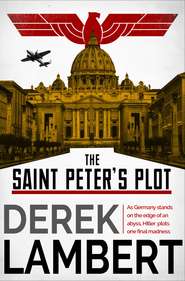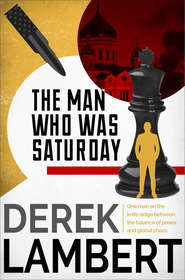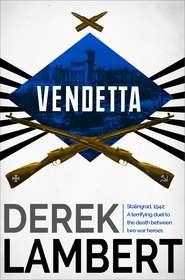По всем вопросам обращайтесь на: info@litportal.ru
(©) 2003-2024.
✖
The Yermakov Transfer
Автор
Год написания книги
2018
Настройки чтения
Размер шрифта
Высота строк
Поля
It was a joke and Viktor laughed. But it was also the truth and a part of him hated the joke.
“Too late now,” he said. “Perhaps I should have the whole thing cut off.”
She nuzzled him, biting his ear. Her skirt was around her waist and her big, brown-nippled breasts were still free. She said: “Don’t ever do that. I’ve got a lot of use for that.” In the long years to come, she implied. And yet, Pavlov thought, with the sun dappling his skin, and the smell of her in his nostrils, I love her. Knowing at the same time that he didn’t, not in the absolute, permanent sense. Love was an emotion he could control. He wasn’t so sure about hate.
Arm in arm, they walked down the mountain road to Sochi where, it was claimed, the mineral waters of Matsesta could help patients suffering from heart diseases, neuroses, hypertension, skin diseases and gynaecological disorders. There wasn’t much that Sochi couldn’t alleviate and the brochures asserted that 95 per cent of all those seeking treatment left the resort considerably improved or cured. But Viktor Pavlov wasn’t among them. His disease went back centuries and no one had ever touched upon a cure.
When they arrived at the Kavkazskaya Riviera sanatorium which took Intourist guests and was therefore prestigious, Olga’s brother, Lev, was waiting for them.
He looked at Viktor with fraternal menace. “Had a good time?” Olga’s parents were also staying at the sanatorium and the view was that Viktor Pavlov was already one of the family and should make it legal.
“Pleasant,” Olga said. “But exhausting.” Allowing the implication to sink home before adding: “It was a long walk.” She smiled contentedly – possessively, Viktor Pavlov thought.
They were standing in the lobby of the sanatorium, breathing cool, remedial air.
Lev said: “I have bad news for you.” He held a long mantilla envelope with the words Moscow University on it.
Olga took the envelope. “Why bad news?”
Lev Soliman grimaced. “Is it ever any other?”
They were all three at the University studying different subjects.
“You’re a pessimist,” Olga told her brother.
“I am a realist.”
“To hell with your realism.”
But her fingers shook as she ripped open the envelope with one decadent, pink-varnished fingernail.
She read the letter slowly. Then she began to shiver.
“What is it?” Viktor asked.
“What’s the good news?” her brother asked.
She re-folded the letter, replacing it in the envelope. “I’ve been expelled from the university,” she said.
They were silent for a moment. Then Viktor demanded: “Why?” He paused because he knew the answer. “You were doing well … your examination marks were good.”
Lev Soliman turned on him. “Don’t pretend you don’t know. Don’t be too much of a hypocrite, a half-caste. She has been expelled because she is a Jew.”
* * *
When they returned to Moscow, Viktor Pavlov told Lev Soliman that he thought he should quit university.
They were walking through Gorky Park, filled this late-summer day, with guitar-strumming youths, picknicking families, lovers, union soldiers and sailors. Bands played, rowing boats patrolled the mossy waters of the lake, the ferris wheel took shrieking girls to heaven and back again.
“Why?” Lev asked. “Your guilt again?”
“Perhaps.” They stopped at a stall near a small theatre and bought glasses of fizzy cherry cordial. They were close now, these two, close enough to exchange insults without malice. “I feel like a traitor.”
“Don’t,” Lev Soliman said. “Feel like a hero.”
“What the hell are you talking about?”
“I’ll tell you.” Lev pointed at the ferris wheel. “Let’s take a ride. No one can overhear us up there. Not even the K.G.B.”
The wheel stopped when they were at its zenith and they looked down on Moscow glazed with heat; the gold cupolas of discarded religions, the drowsy river, the fingers of new apartment blocks. Lev Soliman pointed down at the pygmy people in the park. “Good people,” he said. “A great country. Make no mistake about that.”
“I don’t,” Viktor told him. “I was born in Leningrad. Any country that can come back after losing twenty million is a great country. But not so great if you’re a Jew, eh?”
“But you’re not.”
A breeze sighed in the wheel’s struts; the car perched in space, swayed slightly.
Pavlov said: “I am a Jew.”
“That’s not what it says on your papers.”
“You can’t blame me for that. There are thousands of Jews registered as Soviet citizens through mixed marriages.”
Lev shrugged. “Maybe. But you’re a more convincing case. All your family records destroyed in Leningrad. Perhaps your mother was pure Russian.”
“She was a Jewess.”
“That’s not what your father told the authorities. And he’s registered as a Soviet citizen, too. So you see, your case is pretty clear-cut.”
Viktor twisted round angrily, making the car lurch. “What are you getting at?”
“Simply this.” Instinctively Lev looked around for eavesdroppers; but there were only the birds. “You can be far more useful to the movement than anyone with Jew stamped on his passport.” He gripped Viktor’s arm. “There is a movement within the movement. That’s where you belong.”
* * *
One month later Lev Soliman was expelled from the University. His one-room apartment was searched under Article 64 – “betrayal of the Motherland”. He was taken to the Big House and interrogated. A fortnight later he was transferred to a mental institution. Viktor saw him once more two years later; by that time he was insane.
* * *
Lev Soliman left Viktor Pavlov with the embryo of an underground movement that had its origins in April, 1942, when the Jewish Anti-Fascist Committee of the Soviet Union (JAC) was founded. In those days the Russians needed the Jews to help fight the Nazis and to spread propaganda to the four corners of the world to which the Diaspora had taken them.
For the first time since the Jewish sections of the Communist Party, the Yevsektsia, were disbanded in 1930, Soviet Jewry had in JAC an officially-sanctioned organisation. Its journal was called Unity and Lev Soliman’s parents were among its contributors.
JAC was, of course, another shooting star spluttering in the darkness of prejudice. The Jews thought that, by co-operating with the Soviets in defeating Hitler, they were also constructing a peaceful future in Russia. In 1943, when JAC emissaries Mikhoels and Feffer went on a tour of Jewish communities in the U.S.A., Britain, Canada and Mexico, Joseph Stalin personally wished them well.
Such was the hope of a new understanding between Russians and Jews that Zionist leaders even suggested a meeting between Chaim Weizmann and Stalin. Churchill was asked to get them together at Yalta in 1945; but Churchill turned down the idea: Churchill knew better.
All this time the Solimans worked joyously for the cause and the future of their son, Lev.
Другие электронные книги автора Derek Lambert
The Red Dove




 3.67
3.67
Vendetta




 0
0











